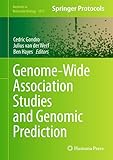Genome-Wide Association Studies and Genomic Prediction [electronic resource] / edited by Cedric Gondro, Julius van der Werf, Ben Hayes.
Series: Methods in Molecular Biology, Methods and Protocols ; 1019Publisher: Totowa, NJ : Humana Press : Imprint: Humana Press, 2013Description: XI, 566 p. 67 illus., 31 illus. in color. online resourceContent type:- text
- computer
- online resource
- 9781627034470
- 570.285 23
- QH324.2-324.25
 eBooks
eBooks
R for Genome-Wide Association Studies -- Descriptive Statistics of Data: Understanding the Data Set and Phenotypes of Interest -- Designing a Genome-Wide Association Studies (GWAS): Power, Sample Size, and Data Structure -- Managing Large SNP Datasets with SNPpy -- Quality Control for Genome-Wide Association Studies -- Overview of Statistical Methods for Genome-Wide Association Studies (GWAS) -- Statistical Analysis of Genomic Data -- Using PLINK for Genome-Wide Association Studies (GWAS) and Data Analysis -- Genome-Wide Complex Trait Analysis (GCTA): Methods, Data Analyses, and Interpretations -- Bayesian Methods Applied to Genome-Wide Association Studies (GWAS) -- Implementing a QTL Detection Study (GWAS) Using Genomic Prediction Methodology -- Genome-Enabled Prediction Using the BLR (Bayesian Linear Regression) R-Package -- Genomic Best Linear Unbiased Prediction (gBLUP) for the Estimation of Genomic Breeding Values -- Detecting Regions of Homozygosity to Map the Cause of Recessively Inherited Disease -- Use of Ancestral Haplotypes in Genome-Wide Association Studies -- Genotype Phasing in Populations of Closely Related Individuals -- Genotype Imputation to Increase Sample Size in Pedigreed Populations -- Validation of Genome-Wide Association Studies (GWAS) Results -- Detection of Signatures of Selection Using FST -- Association Weight Matrix: A Network-Based Approach Towards Functional Genome-Wide Association Studies -- Mixed Effects Structural Equation Models and Phenotypic Causal Networks -- Epistasis, Complexity, and Multifactor Dimensionality Reduction -- Applications of Multifactor Dimensionality Reduction to Genome-Wide Data Using the R Package ‘MDR’ -- Higher Order Interactions: Detection of Epistasis Using Machine Learning and Evolutionary Computation -- Incorporating Prior Knowledge to Increase the Power of Genome-Wide Association Studies -- Genomic Selection in Animal Breeding Programs.
With the detailed genomic information that is now becoming available, we have a plethora of data that allows researchers to address questions in a variety of areas. Genome-wide association studies (GWAS) have become a vital approach to identify candidate regions associated with complex diseases in human medicine, production traits in agriculture, and variation in wild populations. Genomic prediction goes a step further, attempting to predict phenotypic variation in these traits from genomic information. Genome-Wide Association Studies and Genomic Prediction pulls together expert contributions to address this important area of study. The volume begins with a section covering the phenotypes of interest as well as design issues for GWAS, then moves on to discuss efficient computational methods to store and handle large datasets, quality control measures, phasing, haplotype inference, and imputation. Later chapters deal with statistical approaches to data analysis where the experimental objective is either to confirm the biology by identifying genomic regions associated to a trait or to use the data to make genomic predictions about a future phenotypic outcome (e.g. predict onset of disease). As part of the Methods in Molecular Biology series, chapters provide helpful, real-world implementation advice.


